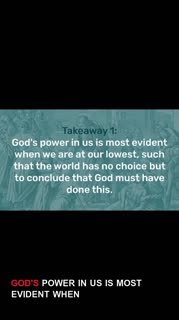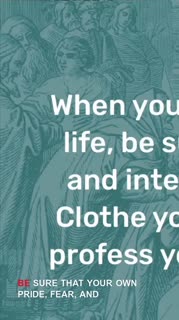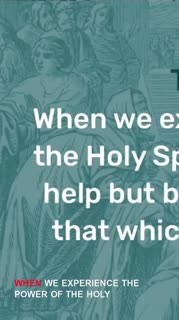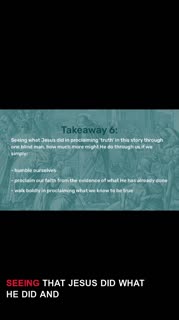From Blindness to Sight: Embracing God's Transformative Power
Summary
In today's message, we explored the profound narrative of John chapter 9, where Jesus heals a man born blind. This story is not just about physical healing but serves as a powerful allegory for spiritual awakening and the revelation of God's glory. The blind man, marginalized and deemed purposeless by society, becomes a vessel through which God's power is displayed. Jesus' interaction with him challenges societal norms and religious assumptions, emphasizing that God's work is often most evident in our lowest moments.
The narrative unfolds with Jesus' disciples questioning the cause of the man's blindness, reflecting a common belief that suffering is a direct result of sin. Jesus refutes this, stating that the man's condition is an opportunity for God's works to be revealed. This challenges us to view our own struggles not as punishments but as opportunities for divine intervention and growth.
The healing process itself is significant. Jesus uses mud and instructs the man to wash in the Pool of Siloam, symbolizing that spiritual enlightenment is a journey, not an instantaneous event. This act of obedience leads to the man's physical and spiritual sight, illustrating that our faith journey involves both divine action and our response.
Throughout the story, various groups react differently to the miracle. The neighbors, Pharisees, and the man's parents each represent different attitudes towards God's work—skepticism, pride, and fear. These responses serve as a mirror for us to examine our own reactions to God's movements in our lives.
Ultimately, the healed man boldly testifies to his transformation, despite opposition. His simple yet profound declaration, "I was blind, but now I see," underscores the personal and undeniable nature of God's work in our lives. This story encourages us to embrace humility, expect God's intervention, and boldly proclaim the truth of our experiences with Him.
Key Takeaways:
- God's Power in Our Weakness: Our lowest moments are often the canvas for God's greatest works. When we feel insignificant or unworthy, God sees an opportunity to display His power, making it evident that the transformation is His doing, not ours. [01:02:38]
- Purpose in Suffering: Difficult circumstances are not always a result of sin but can be opportunities for God's glory to be revealed. Our struggles can lead to growth and deeper faith, aligning us with God's purpose. [01:05:32]
- The Journey of Faith: Spiritual enlightenment is a process. Like the blind man's healing, our understanding and vision of God's truth develop over time. We must be patient and trust in God's perfect timing. [01:12:01]
- Boldness in Testimony: When we experience God's power, we are called to boldly proclaim it. Our personal testimonies of transformation are powerful tools for sharing the gospel and demonstrating God's reality. [01:33:27]
- Humility Unlocks the Spirit: Humility is essential for experiencing the fullness of the Holy Spirit. By emptying ourselves of pride and fear, we make room for God's power to work through us, transforming us and those around us. [01:27:38]
Youtube Chapters:
- [0:00] - Welcome
- [49:13] - Introduction and Prayer
- [51:44] - Reading of John Chapter 9
- [52:30] - The Blind Man's Encounter with Jesus
- [53:18] - The Pharisees' Reaction
- [54:06] - The Parents' Fear
- [54:51] - The Blind Man's Bold Testimony
- [55:46] - Jesus Reveals His Identity
- [56:40] - The Purpose of Miracles
- [57:40] - Jesus' Power Over All Realms
- [58:59] - The Marginalized in Society
- [01:00:39] - The Hopelessness of the Blind Man
- [01:02:38] - God's Power in Our Weakness
- [01:05:32] - Purpose in Suffering
- [01:12:01] - The Journey of Faith
- [01:33:27] - Boldness in Testimony
- [01:27:38] - Humility Unlocks the Spirit
- [01:39:56] - Conclusion and Prayer
Study Guide
Bible Study Discussion Guide
Bible Reading:
- John 9:1-41
---
Observation Questions:
1. What was the initial question the disciples asked Jesus about the blind man, and how did Jesus respond to it? ([51:44])
2. Describe the process Jesus used to heal the blind man. What instructions did He give him? ([52:30])
3. How did the Pharisees react to the healing of the blind man, and what was their main concern? ([53:18])
4. What was the blind man's response when questioned about his healing, and how did he describe his experience? ([54:51])
---
Interpretation Questions:
1. How does Jesus' response to the disciples' question about sin and suffering challenge common beliefs about the relationship between sin and suffering? ([51:44])
2. In what ways does the healing process of the blind man symbolize the journey of spiritual enlightenment and faith? ([52:30])
3. How do the different reactions of the neighbors, Pharisees, and the man's parents reflect various attitudes towards witnessing God's work? ([53:18])
4. What does the blind man's bold testimony reveal about the nature of personal transformation and the power of a simple, truthful declaration? ([54:51])
---
Application Questions:
1. Reflect on a time when you felt marginalized or insignificant. How can you view that experience as an opportunity for God's power to be displayed in your life? ([01:02:38])
2. Consider a current struggle or difficult circumstance in your life. How might this be an opportunity for God's glory to be revealed, and how can you align your perspective with this truth? ([01:05:32])
3. The blind man's healing was a process that required his obedience. What steps of obedience might God be asking you to take in your spiritual journey right now? ([01:12:01])
4. How can you cultivate humility in your life to unlock the fullness of the Holy Spirit's work in and through you? ([01:27:38])
5. Think of a personal testimony of God's work in your life. How can you boldly share this testimony with others to demonstrate God's reality and power? ([01:33:27])
6. Identify an area in your life where you might be allowing pride, fear, or intellect to hinder God's work. What practical steps can you take to overcome these barriers? ([01:26:58])
7. How can you actively expect and prepare for God's intervention in your life, especially in areas where you feel weak or inadequate? ([01:02:38])
Devotional
Day 1: God's Power in Our Weakness
In our moments of weakness and insignificance, God often chooses to display His power most profoundly. The story of the man born blind in John 9 illustrates this truth. Society saw him as purposeless, yet Jesus saw an opportunity for God's glory to be revealed. This narrative challenges us to reconsider how we view our own struggles and weaknesses. Instead of seeing them as limitations, we can see them as opportunities for God to work in and through us. When we feel unworthy or insignificant, it is precisely then that God can demonstrate His transformative power, making it clear that the change is His doing, not ours. [01:02:38]
2 Corinthians 12:9-10 (ESV): "But he said to me, 'My grace is sufficient for you, for my power is made perfect in weakness.' Therefore I will boast all the more gladly of my weaknesses, so that the power of Christ may rest upon me. For the sake of Christ, then, I am content with weaknesses, insults, hardships, persecutions, and calamities. For when I am weak, then I am strong."
Reflection: Think of a current struggle or weakness in your life. How can you invite God to display His power through this situation today?
Day 2: Purpose in Suffering
Suffering is not always a consequence of sin but can be a platform for God's glory to be revealed. In John 9, Jesus refutes the belief that the man's blindness was due to sin, instead presenting it as an opportunity for divine intervention. This perspective invites us to view our own hardships not as punishments but as chances for growth and deeper faith. Our struggles can align us with God's purpose, leading us to a more profound understanding of His work in our lives. By embracing this view, we can find meaning and purpose even in our most challenging circumstances. [01:05:32]
James 1:2-4 (ESV): "Count it all joy, my brothers, when you meet trials of various kinds, for you know that the testing of your faith produces steadfastness. And let steadfastness have its full effect, that you may be perfect and complete, lacking in nothing."
Reflection: Reflect on a difficult situation you are currently facing. How might this be an opportunity for God to reveal His glory and purpose in your life?
Day 3: The Journey of Faith
Spiritual enlightenment is a process, not an instantaneous event. The healing of the blind man in John 9 symbolizes this journey. Jesus uses mud and instructs the man to wash in the Pool of Siloam, illustrating that understanding and vision of God's truth develop over time. This act of obedience leads to both physical and spiritual sight, reminding us that our faith journey involves both divine action and our response. We are encouraged to be patient and trust in God's perfect timing as we grow in our understanding of His truth. [01:12:01]
2 Peter 3:18 (ESV): "But grow in the grace and knowledge of our Lord and Savior Jesus Christ. To him be the glory both now and to the day of eternity. Amen."
Reflection: Consider an area of your spiritual life where you desire growth. What steps can you take today to actively participate in this journey of faith?
Day 4: Boldness in Testimony
When we experience God's power, we are called to boldly proclaim it. The healed man's declaration, "I was blind, but now I see," is a powerful testament to God's work in his life. Despite opposition, he courageously shares his transformation, serving as an example for us to follow. Our personal testimonies of transformation are powerful tools for sharing the gospel and demonstrating God's reality. We are encouraged to embrace humility, expect God's intervention, and boldly proclaim the truth of our experiences with Him. [01:33:27]
Acts 4:20 (ESV): "For we cannot but speak of what we have seen and heard."
Reflection: Think of a recent experience where you witnessed God's work in your life. How can you share this testimony with someone today?
Day 5: Humility Unlocks the Spirit
Humility is essential for experiencing the fullness of the Holy Spirit. By emptying ourselves of pride and fear, we make room for God's power to work through us, transforming us and those around us. The story of the blind man in John 9 highlights the importance of humility in recognizing and responding to God's work. As we humble ourselves, we open our hearts to the Spirit's leading, allowing God to use us as vessels for His glory. This humility not only transforms us but also impacts those we encounter, drawing them closer to God. [01:27:38]
Philippians 2:3-4 (ESV): "Do nothing from selfish ambition or conceit, but in humility count others more significant than yourselves. Let each of you look not only to his own interests, but also to the interests of others."
Reflection: Identify an area in your life where pride or fear may be hindering your spiritual growth. How can you practice humility today to allow the Holy Spirit to work more fully in you?
Quotes
1) "God's power in us is most evident when we are at our lowest, such that the world has no choice but to say, God must have done that. Jesus sees a great opportunity. Society has cast this guy aside. He's a nothing. And Jesus, with his band of disciples, waiting for the next great conqueror, the next great thing to witness. And Jesus goes and he stops. And he says to this man, you know, let's talk. But if you've ever felt insignificant, maybe that God couldn't do something through you just because you don't feel like you're important enough. Maybe you just think, why would God use me to make his truth known in the world? Maybe you're feeling challenged. Maybe life's hard. And you just kind of are like, man, life's too hard. Why would God choose me right now in this circumstance?" [01:02:38] (57 seconds)
2) "All these difficult circumstances in your life that you would rather not have to, you know, Shara talked about this. You'd just rather not have to go through. If it was up to us to pick, we're not going to pick them. Right? We don't want the perseverance. I don't want my team to lose 34 to 3 or whatever the final score was yesterday as I'm sitting in the 95 degree heat on the sunny side of the stadium in a seat that's about half as wide as I am. So I left to go get water and that took 25 minutes. And, you know, I don't want to go through things that are uncomfortable, but honestly, that, you know, trivialness of a football game aside, the difficult things in our life often are there, I think, for two purposes. Number one is so that God can work through us and give us victories and let us know he was there and showed up. But number two, they are how we grow." [01:05:32] (49 seconds)
3) "Walking in the light of God's promises is a process. We're all somewhere between. Having mud on our eyes and shouting ecstatically for joy because of the spiritual vision and understanding that is crystal clear. We're all somewhere right between there. It doesn't matter where you are in between those points. Just know that he seeks to do a good work in you. Philippians 1.6 says, I am certain. Paul writes, he says, I am certain that God who began a good work within you will continue his work until it is finally finished. On the day when Christ returns. Y'all, there's no, when you talk about the concept of riding a bike, you always got to be moving, right? To keep it upright. Man, I am confident God's going to continue his work until the day he comes again." [01:12:01] (47 seconds)
4) "When you see God working in your life, be sure that your own pride, fear, and intellect get out of his way. Clothe yourself with humility and profess your faith in his promises. Y'all, God can't fill me up if I'm filled up with myself. That was obviously the Pharisee's problem. I can't combat fear if I don't know what I have faith in. And I have to constantly remind myself of what that faith is in. But humility is the power, the power that unlocks the Holy Spirit in your life. Let me say that one again because that one's really important. Humility, emptying of yourself with your vision on God and an expectation of him to fill you. Humility is the power that unlocks the Holy Spirit in your life." [01:26:58] (47 seconds)
5) "When we experience the power of the Holy Spirit in our life, we cannot help but being bold to proclaim that which we know to be true. Do not let your boldness, be held back for any of the reasons that you see in this story. Be the blind man. When Jesus reveals something to you, when the Holy Spirit gives you a clear vision about something, be bold in proclaiming that because that has been given to you for a reason. It's been given so that you can share it. It's given so that you can give your testimony. When we testify about what Jesus has done in our life, we are proclaiming him as Lord. And we're sending a message of the gospel through our lives. Through our own circumstances in our life. Don't be afraid to share that. But be bold." [01:33:27] (46 seconds)
6) "Seeing that Jesus did what he did and proclaiming the truth in this story through one blind man, how more might he choose to do through us if we will simply humble ourselves, proclaim our faith from the evidence of what he's already done, and then walk boldly in proclaiming what we know to be true? Y'all, it's not complicated. It's simple. I want to close with Ephesians 2.10, one of my favorite scriptures in the Bible. For we are God's handiwork. This blog, blind man was God's handiwork, and Jesus makes that clear. Who sinned, this man or his parents? Neither, disciples. This was so that God's glory could be shown in this act." [01:40:28] (46 seconds)






